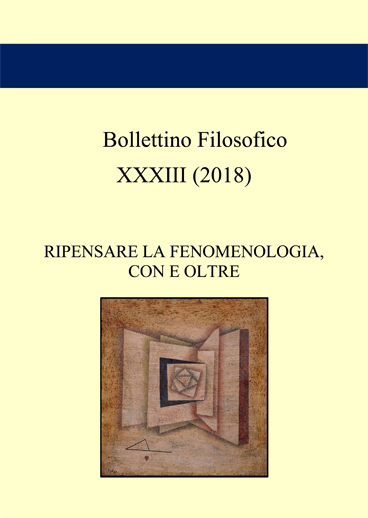La logica non-aristotelica da un punto di vista fenomenologico. Gotthard Günther e Oskar Becker
Abstract
At the beginning of the thirties of the Twentieth century – in conjunction with attempts to revise the principles of classical logic developed by Łukasiewicz and Kleene – Gotthard Günther (1900-1984) propounds a “new theory of thought” focused on criticism of the principle of bivalence through the retreival of speculative reasons of Hegel’s Science of logic, in particular the chapters dedicated to the Doctrine of the essence. In the Hegelian dialectical process of “reflection”, which goes beyond the immediacy of being, Günther sees the philosophical presuppositions for overcoming the classical motifs of thought (such as the undifferentiated identity of the logical object, the prohibition of contradiction and the law of excluded third) in favor of an inclusion, within the logical structure, of the multiplicity of subjects and the multivalence of cognitive relations, in which not only the ego is the logical subject of judgment, but also the “thou” and the other. This non-Aristotelian logic, to the extent that it opens to the intentional multiplicity of the essences, reveals singular points of convergence with the intensional modal systems developed by Oskar Becker (1889-1964) in the field of phenomenological thought. Taking a cue from the reflections on pure analytics performed by Husserl in the last part of Formal and transcendental logic, Becker develops an expanded system of the “logic of consequence” that overcomes the traditional “logic of non-contradiction”, thus rooting the different logical forms – of which the “Aristotelian” is only a special case – in the “essential nature” of man, whose thought, in its different intentional modalities, finds no limits in the traditionally defined logical laws.Downloads
Bollettino Filosofico pubblica in internet, ad accesso aperto, con licenza:
|
|
CCPL Creative Commons Attribution |
L'autore conserva il copyright sul suo contributo, consentendo tuttavia a chiunque "di riprodurre, distribuire, comunicare al pubblico, esporre in pubblico, rappresentare, eseguire e recitare l'opera", purché siano correttamente citati l'autore e il titolo della rivista. L’autore, al momento della proposta di pubblicazione, è inoltre tenuto a dichiarare che il contenuto e l’organizzazione dell’opera è originale e non compromette in alcun modo i diritti di terzi, né gli obblighi connessi alla salvaguardia di diritti morali ed economici di altri autori o di altri aventi diritto, sia per testi, immagini, foto, tabelle, sia per altre parti di cui il contributo può essere composto. L’autore dichiara altresì di essere a conoscenza delle sanzioni previste dal codice penale e dalle leggi speciali per l’ipotesi di falsità in atti ed uso di atti falsi, e che pertanto Bollettino Filosofico è esente da qualsiasi responsabilità di qualsivoglia natura, civile, amministrativa o penale, e sarà dall'autore tenuta indenne da qualsiasi richiesta o rivendicazione da parte di terzi.
